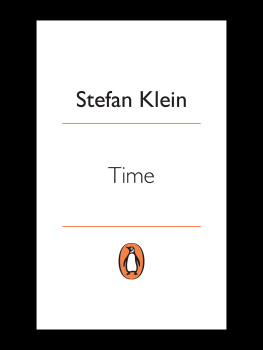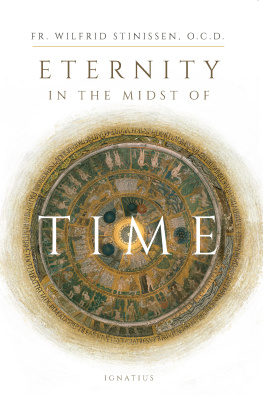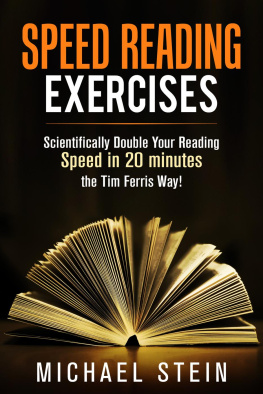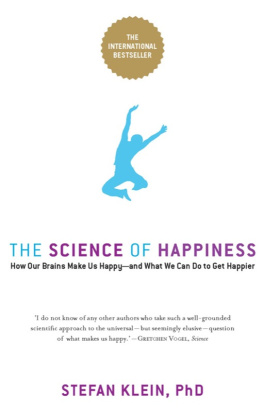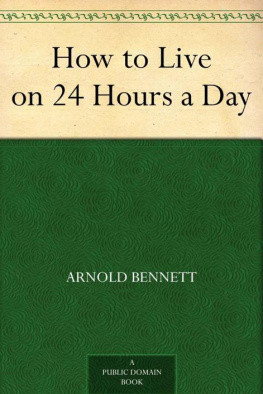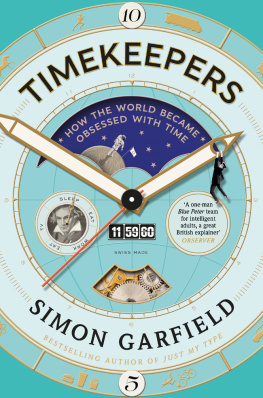PENGUIN BOOKS
TIME
Stefan Klein is one of Europes leading science journalists and writers. Winner of the 1998 Georg von Holtzbrink Prize for Scientific Journalism, he is also the author of the international bestseller The Science of Happiness, which has been published in twenty-eight countries. He lives in Berlin, Germany.
TIME
: a users guide
STEFAN KLEIN
Translated by Shelley Frisch

PENGUIN BOOKS
PENGUIN BOOKS
Published by the Penguin Group
Penguin Books Ltd, 80 Strand, London WC2R 0RL , England
Penguin Group (USA) Inc., 375 Hudson Street, New York, New York 10014, USA
Penguin Group (Canada), 90 Eglinton Avenue East, Suite 700, Toronto, Ontario, Canada M4P 2Y3
(a division of Pearson Penguin Canada Inc.)
Penguin Ireland, 25 St Stephens Green, Dublin 2, Ireland (a division of Penguin Books Ltd)
Penguin Group (Australia), 250 Camberwell Road, Camberwell, Victoria 3124, Australia
(a division of Pearson Australia Group Pty Ltd)
Penguin Books India Pvt Ltd, 11 Community Centre, Panchsheel Park, New Delhi 110 017, India
Penguin Group (NZ), 67 Apollo Drive, Rosedale, Nortii Shore 0632, New Zealand
(a division of Pearson New Zealand Ltd)
Penguin Books (Souui Africa) (Pty) Ltd, 24 Sturdee Avenue, Rosebank.
Johannesburg 2196, Souui Africa
Penguin Books Ltd, Registered Offices: 80 Strand, London WC2R 0RL , England
www.penguin.com
First published in Germany by S. Fischer Verlag 2008
This translation first published by Marlowe and Company 2007
Published in Penguin Books 2008
1
Copyright Stefan Klein, 2006
Translation copyright Avalon Publishing Group, 2007
All rights reserved
The moral right of die autiior has been asserted
Except in the United States of America, diis book is sold subject
to die condition diat it shall not, by way of trade or otherwise, be lent.
re-sold, hired out, or ouierwise circulated witiiout die publishers
prior consent in any form of binding or cover odier than that in
which it is published and without a similar condition including this
condition being imposed on the subsequent purchaser
978-0-14-191804-4
For Alexandra
CONTENTS
Why There Are Morning
People and Night People Why Teenagers
Are Night Owls Better to Be Well-Heeled
and Worn Out than Hale and Hearty
Pacemakers in the Brain Time
Is Motion An Orchestra under the
Cranium When the World
Begins to Race
Time Flies When Youre
Having Fun
Consciousness on
Autopilot
Memory
Transforms Us
A House of Splinters and
Chips
Machines that Kill
Time Crossing the
Threshold of the Moment Pioneers
on an Empty Continent Short on
Time Applying the Brakes
as We Age
Why It Is So Difficult to Stay Focused,
and How to Do It
Sushi Chef and Fidgety
Philip
When We
Lose Our Heads Why Managers
Dont Get Ulcers A Shortage of Time
Is a Matter of Perspective
Why We Always Finish Things at the
Last Possible Minute The
Rich Run Themselves Ragged
Do We Need
a Cosmic Time? Why
Moving Watches Are Slower If You Travel to the East, You
Live Longer The Succession of
Earlier and Later At the
Limits of Physics
First
Step: Sovereignty over Time Second Step: Living in Harmony
with Your Biological Clock Third Step: Cultivating
Leisure Time
Sixth Step: Setting Your
Priorities
Introduction
The Discovery of Inner Time
ONCE IN A great while we experience a magical moment when the laws of time just dont seem to apply: standing atop a mountain, watching the ocean surf, enjoying a creative spurt, or making love. Plans for the future, worries about the present, and memories of the past lose their meaning. Time stands still: the moment envelops all that has ever been and ever will be. Some people report feeling as though the boundaries of their bodies are melting away and they are becoming part of a grander scheme.
Sometimes all it takes is a rousing evening with old friends or a project youre engrossed in, to make the hours fly by as though they were minutes. Youve missed the last train, youve gone way past your usual lunch hour, and you didnt even notice while in the thrall of the here and now.
At some point, time is sure to reenter your consciousness; it is a feeling akin to awakening from an exhilarating sleep.
You catch sight of a clock, and the spell is shattered. W. G. Sebalds novel Austerlitz powerfully evokes the movement ofthat hand, which resembled a sword of justice it jerked forward, slicing off the next one-sixtieth of an hour from the future.high up for all to seewhere the architects of old churches once placed the eye of God. Every traveler has to fix his gaze on these hands. By the same token, every personand every objectin the hall is in this clocks line of vision.
No one in todays society can steer clear of clocks. Clocks are everywhere. Life revolves around them. We race from one meeting to the next and muse wistfully about what we would do if we could only find the time. Sometimes we feel as though we are caught up in a whirlwind and fear being swept away yet we fail to reap the rewards of our haste. Hectic days yield the fewest memories of allas though the time had elapsed without a trace, and is lost forever.
The authority of clocks has come to seem quite natural. We regard these instruments as virtual envoys of a higher power. The railway station hall of Antwerp is not the only place people submit to the power of two hands moving around a dial high above their heads. More or less consciously, all of us believe that a mysterious cosmic ticking clock molds our lives, taking the form of a second hand on our wristwatches. If we happen to forget the presence of clocks, we later wonder whether this experience was a dream or a reality.
Benjamin Franklin wrote that time is the stuff life is made of. But is the time we live by truly identical to the time we read on clocks? Some hours race by, whereas others seem to stretch out almost indefinitelyand all the while the big hand moves like clockwork, the same as ever. It seems as though another, second time is entwined with the time displayed on clocks: a time that originates within us.
Inner time abides by its own mysterious laws. Why do unpleasant situations seem to be agonizingly slow, yet happy moments speed by? Why do we often get distracted in our finest hours? Why does life go by faster and faster as we grow older?
The only thing we are sure of when it comes to time is that it is in short supply. This is odd because, measured in hours and years, we are richer than people have ever been. No previous generation has had so much leisure time and such a long life span. Still, more than a third of all Americans report that they do not have enough time. And the number keeps growing with each new survey.

